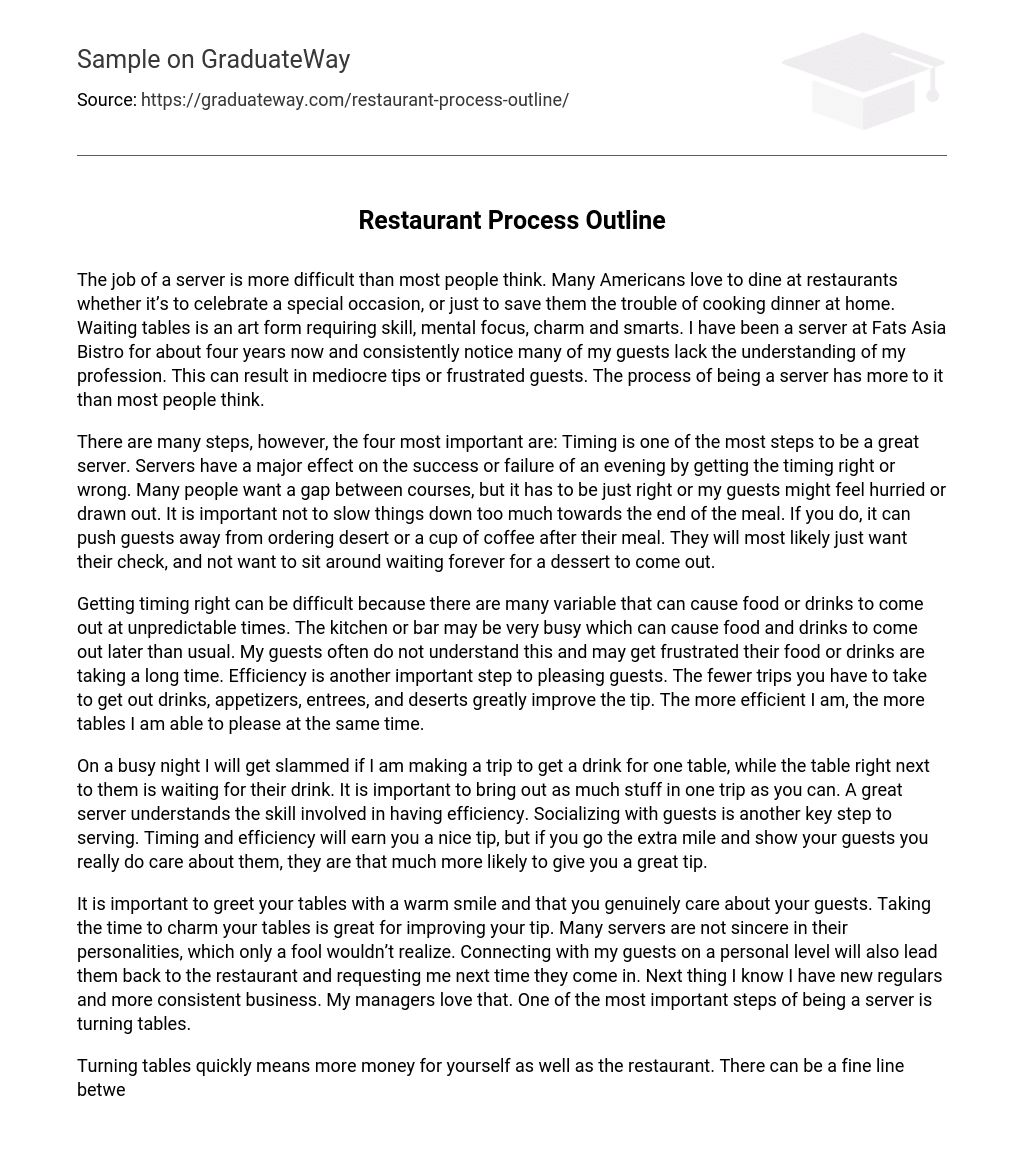The task of being a server is more complex than what is commonly perceived. Numerous individuals in the United States enjoy dining out for various reasons, whether it be commemorating a special event or simply avoiding the hassle of preparing dinner at home. Waiting tables demands a combination of skills, mental acuity, charisma, and intelligence. Having worked as a server at Fats Asia Bistro for approximately four years, I consistently observe that many patrons do not fully grasp the nature of my occupation. As a consequence, this can lead to subpar tips or dissatisfied customers. The role of a server encompasses more facets than most individuals tend to recognize.
There are multiple important steps to be a great server, but the crucial four are: Timing plays a significant role in the success or failure of an evening as servers can either get it right or wrong. Guests often prefer a gap between courses, but it must be just right to avoid making them feel rushed or bored. It is crucial to avoid slowing things down excessively towards the end of the meal, as it may discourage guests from ordering dessert or a cup of coffee. Instead, they will probably prefer to receive their check promptly without waiting too long for their dessert to be served.
It can be challenging to time food and drinks correctly due to various factors, resulting in unpredictable serving times. The kitchen or bar’s high levels of activity may cause delays in delivering food and drinks. This lack of understanding often frustrates my guests as they perceive long waiting times. Ensuring efficiency is crucial in satisfying guests. Minimizing the number of trips needed to serve drinks, appetizers, entrees, and desserts significantly improves tips. The more efficient I am, the better I can accommodate multiple tables simultaneously.
On a busy night, it can be overwhelming for a server when they have to make multiple trips to get drinks for different tables. This is why it is crucial for a server to bring out as much as possible in one trip, showcasing their efficiency. Additionally, socializing with guests is an important aspect of serving. While timing and efficiency may earn a server a decent tip, going the extra mile to show genuine care for guests significantly increases the likelihood of receiving a generous tip.
It is crucial to greet your tables with a friendly smile and genuine concern for your guests. Dedication to captivating your tables is beneficial for enhancing your tip. Numerous servers lack sincerity in their demeanor, which is obvious to anyone. Establishing a personal connection with my guests will also result in their return to the restaurant and request for my service on their next visit. Consequently, I am able to develop a group of loyal customers and ensure steady business, pleasing my managers. The act of turning tables is a fundamental aspect of being a server.
Maximizing table turnover is both beneficial for the server and the restaurant. However, there is a delicate balance between turning tables too quickly or not quickly enough. If I rush the process, my guests may feel hurried, resulting in a diminished tip and discouraging them from returning. On the other hand, by taking too long, I have the opportunity to develop a rapport with my guests and potentially increase my tip. Nonetheless, this approach risks losing future tables. Complicating matters, my manager may face pressure to accommodate waiting guests and would likely disapprove of a slow table turnover rate.
She will have to handle unhappy guests waiting to be seated, as serving is a challenging profession that requires years of practice to perfect. With variables that constantly change, it can be difficult to maintain consistency every night. However, by mastering the controllable aspects such as timing, efficiency, socializing, and table turnover, I can ensure great service consistently. It is crucial for Americans who dine at restaurants to understand the difficulty and unpredictability of this job.





